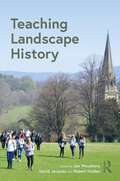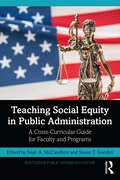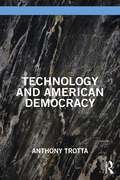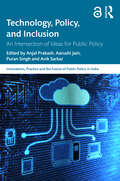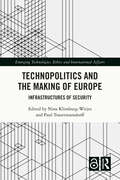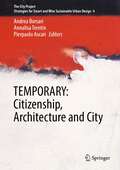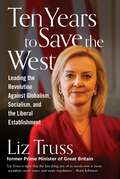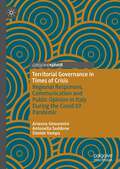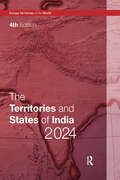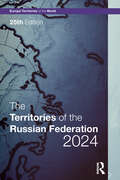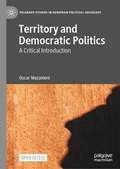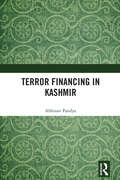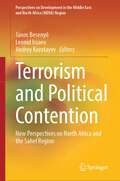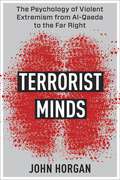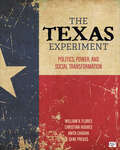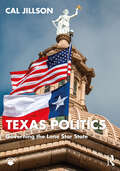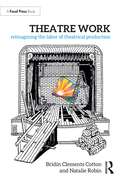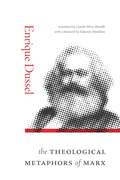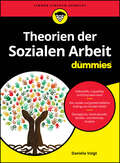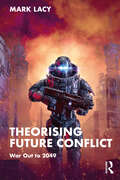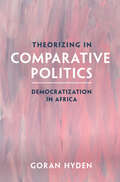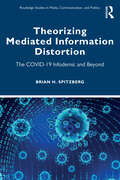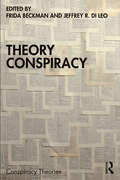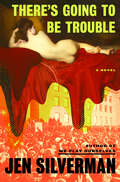- Table View
- List View
Teaching Landscape History
by Jan Woudstra David JacquesLandscape history is changing in content and style to address the issues of today. Experienced teachers and authors on the history of gardens and landscapes come together in this new volume to share ideas on the future of teaching history in departments of landscape architecture, archaeology, geography and allied subjects. Design history remains important, but this volume brings to the fore the increasing importance of environmental history, economic history, landscape history, cultural landscapes, environmental justice and decolonisation, ideas of sustainability and climate change amelioration, which may all be useful in serving the needs of a widening range of students in an increasingly complex world. The main themes include: what history should we narrate in the education of landscape architects? how can we recognise counter-narratives and our own bias? how should we engage the students in the history of their chosen profession? how can designers and researchers be persuaded of the relevance of history teaching to theory and practice? and what resources do we need to develop teaching of landscape histories? This book will be of interest to anyone teaching courses on landscape architecture, urban design, horticulture, garden design, architectural history, cultural geography and more.
Teaching Social Equity in Public Administration: A Cross-Curricular Guide for Faculty and Programs (Routledge Public Affairs Education)
by Sean A. McCandless and Susan T. GoodenPublic administration education programs prepare students in the provision of important public and nonprofit services, so it is essential that such programs help prepare administrators to advance social equity, one of the pillars of the discipline. This exciting new book from social equity authorities Sean McCandless and Susan T. Gooden demonstrates how public administration faculty can teach social equity across the curriculum, in practical terms. This edited collection features chapters from authors experienced in both public administration and in teaching social equity. Each chapter discusses teaching social equity in a particular class (Introduction to Public Administration, Organizational Dynamics and Theory, Human Resources, Policy Process, Research Methods, Capstones, and more) through distinct pedagogical practices that advance student learning (including case studies, community engagement projects, and simulations). The text captures an array of instructional approaches to social equity within public affairs education, particularly at the graduate level. It includes approaches from both established and newer instructors, across a diversity of universities. The book serves as an important resource to faculty who teach these courses, as well as the students who take them. Most importantly, it is a resource to academics and practitioners alike who share a commitment to fairness in the implementation of public services.
Technology and American Democracy
by Anthony TrottaThe growth and proliferation of technology in American society places new demands on the U.S. government and the health of its democracy, affecting both policymaking and public administration. Technology and American Democracy explores the underpinning democratic theories, including constitutional justifications, that guide decision makers during the application of Information Technology (IT) in governance to promote democratic principles such as transparency and accountability. The book examines the capacity of IT to facilitate deliberative democracy, alter modern bureaucratic structures and functions, and affect areas of public policy including public budgeting and performance measurement. Author Anthony Trotta demonstrates the ways in which technology creates new problems for contemporary government, including a discussion of virtual currency and its possible issues that must be addressed by the public sector. The discussion avoids highly technical language and confusing industry jargon, focusing instead on explaining important concepts in an accessible fashion, applicable to a broad spectrum of readers. Technology and American Democracy is required reading for students enrolled in courses on politics, public administration, and public policy.
Technology, Policy, and Inclusion: An Intersection of Ideas for Public Policy (Innovations, Practice and the Future of Public Policy in India)
by Anjal Prakash, Aarushi Jain, Puran Singh, and Avik SarkarTechnology, Policy, and Inclusion looks at the intersections between public policy and technology in India. It explores the barriers in instituting effective governance and development and examines how these can be mitigated through technological interventions in developing countries. Increased digitisation of the economy has added to the development challenges in India and issues such as exclusion and social inequality. This volume stresses the need for governments to leverage technology to bring more vulnerable and marginalised groups into the fold of financial and social inclusion. It also focuses on the importance of regulation for a responsible integration of technologies and minimising risks. The book includes examples and case studies from different areas including management of the COVID-19 pandemic through digital means, real estate digital infrastructure, digital census, e-markets for farmers, and government interventions that use technology to deliver financial services in remote areas of the country. It also outlines various solutions for fostering equity and socio-economic development. Part of the Innovations, Practice and the Future of Public Policy in India series, this volume will be of interest to students and researchers of public policy, political science, development studies, and sociology as well as policy professionals and technocrats. This book is freely available as a downloadable Open Access PDF at http://www.taylorfrancis.com under a Creative Commons (CC-BY-NC-ND) 4.0 license.
Technopolitics and the Making of Europe: Infrastructures of Security (Emerging Technologies, Ethics and International Affairs)
by Paul TrauttmansdorffThis book explores the processes and practices of the securitization and de-securitization of European infrastructures and how political institutions interact with security and insecurity. Expert contributors address distinct areas, from border politics and biosecurity to health governance and law and border control enforcement, to examine the various ways in which infrastructures are envisioned, designed, negotiated and built. They explore how ‘infrastructuring’ contributes to emergent forms of European identity, integration, and statehood. The book will appeal to scholars and students of Science and Technology Studies, Political Sociology, Critical Security Studies, International Relations, European Integration Studies, Infrastructure Studies, or Critical Border and Migration Studies. The Introduction and the Afterword of this book are freely available as a downloadable Open Access PDF at http://www.taylorfrancis.com under a Creative Commons Attribution-Non Commercial-No Derivatives (CC-BY-NC-ND) 4.0 license.
TEMPORARY: Citizenship, Architecture and City (The City Project #4)
by Andrea Borsari Annalisa Trentin Pierpaolo AscariThis book offers a comprehensive overview of forces shaping urban renewal and the sustainable and inclusive transformation of contemporary cities. It discusses temporariness and uncertainty of citizenship, participation, and inclusion, as well as the energy and digital transformation, merging different perspectives, such as the social, philosophical, economic, and architectural ones. Based on revised and extended contributions to the International Congress “TEMPORARY: Citizenship, Architecture and City", held virtually on November 20-21, 2022, from the University of Bologna, this book offers extensive information and a thought-provoking reading to researchers in architecture, anthropology, social and environmental policy, as well as to professionals and policy makers involved in planning the city of the future.
Ten Years to Save the West
by Liz TrussCan the West Be Saved? Liz Truss, the former Conservative prime minister of Great Britain, thinks that&’s an open question.During her ten years at the highest levels of the British government, she often found that she was the only conservative in the room. She witnessed, first-hand, the machinations of globalists who would like nothing more than to impose corporate state-socialism on the world. Freedom is at risk, she warns, and the Conservative Party in Britain—and the Republican Party in the United States—are ill-equipped to defend it. The problem? Conservatives have accepted too many of the left&’s taking points, allowed the left to set the political agenda, and capitulated endlessly whenever the left has sought to impose bigger government and curtail individual freedoms. The dictatorial excesses during the Covid-19 lockdowns should have been a stark warning because they are a precursor of things to come if conservatives continue to waffle on principle, surrender on policy, and fail with the electorate. In Ten Years to Save the West, Liz Truss reveals:Why socialism—despite its endless record of failure—remains popular, both with global elites and with the next generationThe clear and present danger of the ever-expanding &“administrative state&”How conservative parties are complicit in policies of &“managed decline&”Why we cannot ignore the threat of an aggressive ChinaWhy Ronald Reagan and Margaret Thatcher should remain the guiding lights for conservatives on both sides of the AtlanticUrgent, detailed, and full of insights gleaned from the highest levels of politics, Liz Truss&’s warning to the West cannot be ignored.
Territorial Governance in Times of Crisis: Regional Responses, Communication and Public Opinion in Italy During the Covid-19 Pandemic
by Arianna Giovannini Antonella Seddone Davide VampaThis book offers a comprehensive exploration of multi-level governance, political communication and public opinion in Italy during the Covid-19 emergency. Italy’s territorial arrangements of blending aspects of unitary and federal systems within a ‘regionalized’ framework underscore the tensions between centralization and decentralization, a theme echoed in many other nations. Given the state of flux and lack of clear direction of Italian regionalism at the onset of the pandemic, the analysis provides particularly interesting insights into the effects of this unprecedented crisis on regional dynamics. Covid-19 acted as a catalyst, amplifying and exacerbating existing territorial disparities, while also highlighting the resilience and adaptability of some regions. The book delves into the national and sub-national responses to the pandemic, examines how politicians and regional leaders presented them, and how citizens perceived these responses. Through this analysis, it provides deeper insights into the intricate interplay between centralization and decentralization, as well as the diverse strategies employed to address a wide spectrum of health, social, and economic challenges. Ultimately, by moving from institutions to citizens, the book reflects on how external shocks can both challenge the democratic underpinnings of decentralization and offer opportunities to strengthen them.
The Territories and States of India 2024 (Europa Territories of the World series)
by Meena KhanThis invaluable collection of information provides an in-depth guide to the regional dimension of the politics and economy of this vast and complex country. Incomparable in its coverage, which includes a detailed chronology for India as a whole, a bibliography, contact details for leading officials, and an historical account and economic survey for each of the twenty-nine states and seven territories, it supplies the reader with a more complete understanding of India as a whole.
The Territories of the Russian Federation 2024 (Europa Territories of the World series)
This excellent reference source brings together hard-to-find information on the constituent units of the Russian Federation.The introduction examines the Russian Federation as a whole, followed by a chronology, demographic and economic statistics, and a review of the Federal Government. The second section comprises territorial surveys, each of which includes a current map. This edition includes surveys covering the annexed (and disputed) territories of Crimea and Sevastopol, as well as updated surveys of each of the other 83 federal subjects. The third section comprises a select bibliography of books. The fourth section features a series of indexes, listing the territories alphabetically, by Federal Okrug and Economic Area. Users will also find a gazetteer of selected alternative and historic names, a list of the territories abolished, created or reconstituted in the post-Soviet period, and an index of more than 100 principal cities, detailing the territory in which each is located.
Territory and Democratic Politics: A Critical Introduction (Palgrave Studies in European Political Sociology)
by Oscar MazzoleniThe book provides a comprehensive and updated introduction to concept of territory in the study of democratic politics. Territory plays a rather marginal role in the traditional conceptions of democracy that in many ways still prevail today. Democratic politics is often analysed from the point of view of its institutions, citizens and voters, while little is said about the territory through which it is expressed – at most it provides a broader perimeter or context of political and institutional action. The book offers, instead, an introductory theoretically-oriented discussion of crucial issues such as the genesis of state-nation, the transformation of democratic citizenship, the current borders’ policies, the rising of territorial populism and the experience of 19-covid pandemic.This is an open access book.
Terror Financing in Kashmir
by Abhinav PandyaThis book analyses the layered and complex web of terror financing in Kashmir. It examines the role of multiple actors — including formal and informal, state and non-state, profit and non-profit, and local and international — to delineate the various strands of an intricate financial system. It shows how, over time, these sophisticated networks have largely remained elusive to Indian counter-terrorism agencies and the need for a specialised and focused effort to understand it. Drawing on interviews with confidential sources within terror networks, as well as inputs and intel from security agencies on the ground, the author lays the groundwork for a robust counter-terrorism strategy in Kashmir. This book will be a must read for professionals and researchers in security studies, military and strategic studies, politics and international relations, and South Asian studies.
Terrorism and Political Contention: New Perspectives on North Africa and the Sahel Region (Perspectives on Development in the Middle East and North Africa (MENA) Region)
by János Besenyő Leonid Issaev Andrey KorotayevAgainst the backdrop of terrorist activity and the emergence of new conflicts in the MENA region, this book identifies factors of political contestation and analyzes organizational forms and dynamics of terrorism and conflict in North Africa and the Sahel. Written by an international selection of authors from different fields, the book covers topics such as the radicalization of terrorist organizations operating in the region, the financing of terrorism, the role of migration, the radicalization of women, the influence and motives of great powers and external factors such as France in the region, and the impact of the war in Ukraine. The book appeals to scholars and students of politics and international relations as well as African and Middle Eastern studies.
Terrorist Minds: The Psychology of Violent Extremism from Al-Qaeda to the Far Right (Columbia Studies in Terrorism and Irregular Warfare)
by John HorganWhat makes a person want to become a terrorist? Who becomes involved in terrorism, and why? In what ways does participating in violent extremism change someone? And how can people become deradicalized?John Horgan—one of the world’s leading experts on the psychology of terrorism—takes readers on a globe-spanning journey into the terrorist mindset. Drawing on groundbreaking personal interviews as well as decades of research from psychologists and others, he traces the pathways that lead people into violent extremism and explores what happens to them as their involvement deepens. Horgan provides an up-to-date, evidence-based understanding of the patterns, motives, and mentalities of violent extremists from the Islamic State and al-Shabaab to white supremacists and incels. He argues that there is not a straightforward psychological profile of a terrorist, in part because of the great variety of today’s extremists, who are able to attract a more diverse pool of recruits than ever before. But even though there is no one-size-fits-all profile, psychological study can provide crucial insight into why and how people become terrorists.Accessible and nuanced, Terrorist Minds is an essential book for readers interested in what psychology can explain about extremist behavior.
The Texas Experiment: Politics, Power, and Social Transformation
by Christina Hughes William V. Flores Anita Chadha Gene PreussThe Texas Experiment: Politics, Power, and Social Transformation provides students with an all-encompassing view of Texas government. The book brings together the historical and the contemporary, the political and the personal, to walk students through the state′s past, present, and future. Through its rich historical narrative that tells the unvarnished story of how Texas came to be, to its depictions of the processes and structure of Texas government, and finally with its shifting demographics, we learn that the soul of Texas is multicultural, diverse, and thriving. The Texas Experiment empowers students to develop their social and personal responsibility so that they can all be a force of positive change in Texas′s vibrant culture. This title is accompanied by a complete teaching and learning package. Contact your SAGE representative to request a demo. Learning Platform / Courseware SAGE Vantage is an intuitive learning platform that integrates quality SAGE textbook content with assignable multimedia activities and auto-graded assessments to drive student engagement and ensure accountability. Unparalleled in its ease of use and built for dynamic teaching and learning, Vantage offers customizable LMS integration and best-in-class support. It’s a learning platform you, and your students, will actually love. Learn more. Assignable Video with Assessment Assignable video (available in SAGE Vantage) is tied to learning objectives and curated exclusively for this text to bring concepts to life. Watch a sample video now. LMS Cartridge: Import this title’s instructor resources into your school’s learning management system (LMS) and save time. Don’t use an LMS? You can still access all of the same online resources for this title via the password-protected Instructor Resource Site. Learn more.
The Texas Experiment: Politics, Power, and Social Transformation
by Christina Hughes William V. Flores Anita Chadha Gene PreussThe Texas Experiment: Politics, Power, and Social Transformation provides students with an all-encompassing view of Texas government. The book brings together the historical and the contemporary, the political and the personal, to walk students through the state′s past, present, and future. Through its rich historical narrative that tells the unvarnished story of how Texas came to be, to its depictions of the processes and structure of Texas government, and finally with its shifting demographics, we learn that the soul of Texas is multicultural, diverse, and thriving. The Texas Experiment empowers students to develop their social and personal responsibility so that they can all be a force of positive change in Texas′s vibrant culture. This title is accompanied by a complete teaching and learning package. Contact your SAGE representative to request a demo. Learning Platform / Courseware SAGE Vantage is an intuitive learning platform that integrates quality SAGE textbook content with assignable multimedia activities and auto-graded assessments to drive student engagement and ensure accountability. Unparalleled in its ease of use and built for dynamic teaching and learning, Vantage offers customizable LMS integration and best-in-class support. It’s a learning platform you, and your students, will actually love. Learn more. Assignable Video with Assessment Assignable video (available in SAGE Vantage) is tied to learning objectives and curated exclusively for this text to bring concepts to life. Watch a sample video now. LMS Cartridge: Import this title’s instructor resources into your school’s learning management system (LMS) and save time. Don’t use an LMS? You can still access all of the same online resources for this title via the password-protected Instructor Resource Site. Learn more.
Texas Politics: Governing the Lone Star State
by Cal JillsonThe ninth edition of this popular text has been expanded and updated to better fit the needs of a stand-alone Texas politics course. Jillson continues to approach the politics of the Lone Star State from historical, developmental, and analytical perspectives, while giving students the most even-handed, readable, and engaging description of Texas politics available today. Students are encouraged to connect the origins and development of government and politics in Texas to its current practice and the alternatives possible through change and reform. This text helps instructors prepare their students to master the origin and development of the Texas Constitution, the structure and powers of state and local government in Texas, how Texas fits into the U.S. federal system, as well as political participation, the electoral process, and public policy in Texas. An author-written Test Bank is available as Support Material on the Webpage for the book: www.routledge.com/Texas-Politics-Governing-the-Lone-Star-State/Jillson/p/book/9781032513386 Texas Politics offers instructors and students an unmatched range of pedagogical aids and tools. Each chapter opens with an engaging vignette and a series of focus questions to orient readers to the learning objectives at hand and concludes with a chapter summary, a list of key terms, review questions, suggested readings, and web resources. “Let’s Compare” boxes help students see how Texas sits alongside other states, “Texas Legends” boxes spotlight key figures in Texas political history, “Pro & Con” boxes bring conflicting political views into sharper focus; and every chapter features a timeline of important events in Texas history. New to the ninth edition • Covers the 2022 state and national elections, the 2023 legislative session, and the 2020 national elections as they affect Texas. • Highlights Governor Greg Abbott’s call for policy solutions to the vulnerability of the Texas energy grid; Texas voter eligibility laws; abortion and gun violence; and political consequences of redistricting after the wake of the 2020 census. • Provides a detailed study of the 2022–23 state budget and the taxing and spending decisions that went into it, including the school funding and property tax reforms of 2019.
Theatre Work: Reimagining the Labor of Theatrical Production
by Brídín Clements Cotton Natalie RobinTheatre Work: Reimagining the Labor of Theatrical Production investigates both the history and current realities of life and work in professional theatrical production in the United States and explores labor practices that are equitable, accessible, and sustainable.In this book, Brídín Clements Cotton and Natalie Robin investigate the question of artmaking, specifically theatrical production, as work. When the art is the work, how do employers navigate the balance between creative freedom and these equitable, accessible, and sustainable personnel processes? Do theatrical production operations value the worker? Through data analyses, worker narratives, and analogues to the evolving gig economy, Theatre Work questions everything about theatrical production work – including our shared history, ways of operating, and assumptions about how theatre is made – and considers what might happen if the American Theatre was reborn in an entirely new form.Written for members of the theatrical production workplace, leaders of theatrical institutions and productions, labor organizers, and industry union leaders, Theatre Work: Reimagining the Labor of Theatrical Production speaks to the ways that employers and workers can reimagine how we work.
The Theological Metaphors of Marx
by Enrique DusselIn The Theological Metaphors of Marx, Enrique Dussel provides a groundbreaking combination of Marxology, theology, and ethical theory. Dussel shows that Marx unveils the theology of capitalism in his critique of commodity fetishization. Capitalism constitutes an idolatry of the commodity that undergirds the capitalist expropriation of labor. Dussel examines Marx’s early writings on religion and fetishism and proceeds through what Dussel refers to as the four major drafts of Capital, ultimately situating Marx’s philosophical, economic, ethical, and historical insights in relation to the theological problems of his time. Dussel notes a shift in Marx’s underlying theological schema from a political critique of the state to an economic critique of the commodity fetish as the Devil, or anti-God, of modernity. Marx’s thought, impact, and influence cannot be fully understood without Dussel’s historic reinterpretation of the theological origins and implications of Marx’s critiques of political economy and politics.
Theorien der Sozialen Arbeit für Dummies (Für Dummies)
by Daniela VoigtTheorien – ganz schön schlau und gar nicht grau Die Soziale Arbeit ist eine Handlungswissenschaft, vergleichbar mit einem Werkzeugkasten. Aber was nutzen die Werkzeuge, ohne zu verstehen warum? In diesem Buch erhalten Sie eine breite Auswahl an theoretischem Wissen, das auf den Arbeitsalltag in sozialen Berufen zugeschnitten ist. Egal, ob Sie ein Neuling, erfahrener Profi oder Studierender sind, hier finden Sie präzise und verständliche Informationen, die Ihnen helfen, die Theorien der Sozialen Arbeit zu verstehen und auf Ihre Praxis zu übertragen. Sie erfahren Was sich hinter Begriffen wie Empowerment, Capability oder Lebensweltorientierung verbirgt Welche traditionellen Theorien, angepasst auf die heutige Praxis, noch aktuell wichtig sind Was für konkrete Handlungsempfehlungen sich aus den Theorien ableiten lassen
Theorising Future Conflict: War Out to 2049 (Routledge Studies in Conflict, Security and Technology)
by Mark LacyThis book explores the changing tactics, technologies and terrains of twenty-first century war. It argues that the world in 2049 is unlikely to look like the climate change/artificial intelligence (AI) dystopia depicted in Blade Runner 2049, but nor will it be a world where conflict and war has been transformed by a ‘civilising process’ that eradicates violence and conflict from the human condition. 2049 is also the year that the US Department of Defense has suggested China will become a world-shaping military power. All states will be engaged in ‘arms races’ across a variety of new tools and technologies—from drones, robotics, AI and quantum computing—that will transform politics, economy, society and war. Drawing on thinkers such as Zygmunt Bauman and Paul Virilio, the book suggests that future war will be shaped by three broad tendencies that include a broad range of tactics, technologies and trends; the impure, the granular and the machinic. Through discussions of cybersecurity, urban war, robotics, AI, climate change, science fiction and new strategic concepts, it examines how these tendencies might evolve in the different geopolitical futures and types of war ahead of us. The book provides a thought-provoking and distinctive framework through which to think about the changing character of war. It concludes that for all the novel and dangerous challenges ahead, the futuristic possibilities of warfare will likely continue to be shaped by problems familiar to students of international relations and the history of war—albeit problems that will play out in geopolitical and technological contexts that we have never encountered before. This book will be of much interest to students of critical war studies, security studies, science and technology studies, and International Relations in general.
Theorizing Mediated Information Distortion: The COVID-19 Infodemic and Beyond (Routledge Studies in Media, Communication, and Politics)
by Brian H. SpitzbergThis book explores the phenomenon of distortion of information through media via the lens of the COVID-19 pandemic, and the ways in which relevant information distortion and virality have occurred in regard to the disease and its risks. Positing that the interrelated processes of misinformation, disinformation, fake news and conspiracy theories are related forms of distortion of information through media (DIM) and can only be understood through a multilevel theoretical model that incorporates message-based, individual difference, social network-based, societal and geotechnical factors, Brian H. Spitzberg develops an integrative, well-argued, and well-evidenced framework within which these issues can and should be addressed. This book offers a model for further research across such disciplines as communication, journalism/media studies, political science, sociology, cognitive psychology, social psychology, evolutionary psychology, public health, big data analytics, social network analytics, computational linguistics and geographic information sciences, and will interest researchers and students in those areas.
Theory Conspiracy (Conspiracy Theories)
by Frida Beckman Di Leo, Jeffrey R.Theory Conspiracy provides a state-of-the-art collection that takes stage on the meeting and/or battlegrounds between conspiracy theory and theory-asconspiracy. By deliberately scrambling the syntax—conspiracy theory cum theory conspiracy—it seeks to open a set of reflections on the articulation between theory and conspiracy that addresses how conspiracy might rattle the sense of theory as such. In this sense, the volume also inevitably stumbles on the recent debates on postcritique. The suspicion that our ways of reading in the humanities have been far too suspicious, if not paranoid, has gained considerable attention in a humanities continuously questioned as superfluous at best and leftist and dangerous at worst. The chapters in this volume all approach this problematic from different angles. It features clear engaging writing by a set of contributors who have published extensively on questions of paranoia, conspiracy theory, and/or the state of theory today. This collection will appeal to readers interested in conspiracy theories, critical theory, and the future of humanities.
There's Going to Be Trouble: A Novel
by Jen SilvermanA woman is pulled into a love affair with a radical activist, unknowingly echoing her family&’s dangerous past and risking the foundations of her future in this electrifying novel.&“An exhilarating novel of star-crossed romances and radical politics, with writing so evocative I swear I could smell the tear gas.&”—Nathan Hill, New York Times bestselling author of The Nix and WellnessMinnow has always tried to lead the life her single father modeled—private, quiet, hardworking, apolitical. So she is rocked when an instinctive decision to help a student makes her the notorious public face of a scandal in the small town where she teaches. As tensions rise, death threats follow, and an overwhelmed Minnow flees to a teaching position in Paris. There, she falls into an exhilarating and all-consuming relationship with Charles, a young Frenchman whose activism has placed him at odds with his powerful family. As Minnow is pulled in to the daring protest Charles and his friends are planning, she unknowingly almost repeats a secret tragedy from her family&’s past. Her father wasn&’t always the restrained, conservative man he appears today. There are things he has taken great pains to conceal from his family and from the world.In 1968, Keen is avoiding the Vietnam draft by pursuing a PhD at Harvard. He lives his life in the basement chemistry lab, studiously ignoring the news. But when he unexpectedly falls in love with Olya, a fiery community organizer, he is consumed by her world and loses sight of his own. Learning that his deferment has ended and he&’s been drafted, Keen agrees to participate in the latest action that Olya is leading—one with more dangerous and far-reaching consequences than he could have imagined.Minnow&’s and Keen&’s intertwining stories take us through the turmoil of the late sixties student movements and into the chaos of the modern world. Exploding with suspense, heart, and intelligence, There&’s Going to Be Trouble is a story about revolution, legacy, passionate love, and how we live with the consequences of our darkest secrets.
